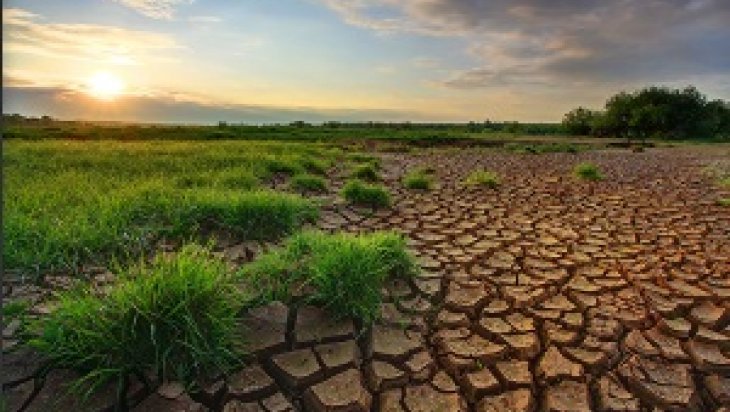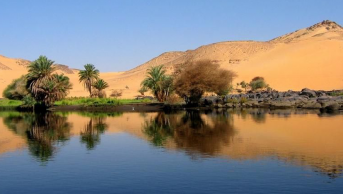An Agenda for Integration: Climate Change and Transboundary Water Issues in the Middle East

Integrating climate change into transboundary water politics is not easy. Apart from being a relatively new focus of attention (which partly explains few number of references to it in international treaties), “climate change” bears a number of challenges including uncertainty about expected impacts; and disagreement over how to deal with those impacts. Further, there are even gaps between planning activities and implementation, and lack of coordination among different levels of scale.
Despite the uncertainties and other challenges around the issue of climate change integration into political decision making, it becomes increasingly apparent that the Middle East is one of the forerunner regions across the globe that suffers the water related impacts of climate change. Therefore, transboundary water politics in the Middle East should be based on the already visible certainty (i.e. not on the uncertainties) that climate change is heavily and badly affecting transboundary water resources in the region in various ways, including diminishing precipitations, increasing extreme weather events (such as floods and droughts) and worsening water quality. These fundamental problems are further aggravating the existing tensions in the region at large, via triggering agricultural losses and thus societal pressures in farmer-based communities.
A recent Adelphi Report (Water and Climate Diplomacy: Integrative Approaches for Adaptive action in Transboundary River Basins) outlines key water governance instruments in support of climate change adaptation and lists a number of recommendations concerning relevant actors at national, transboundary and international actors; which worth quoting at length: “promote and support the incorporation of basin-wide, transboundary thinking in national adaptationplanning and, simultaneously, the integration of climate change adaptation policies into existing andnewly established basin institutions;support activities to strengthen linkages between regional and national river basin governance throughthe establishment of specific organizational units or standardized communication procedures;promote transboundary and, where possible, basin-wide data and information sharing, including specificclimate change activities (e.g. vulnerability assessments), and facilitate their simultaneous use forconfidence-building and ideally the elaboration of joint adaptation responses;ensure sufficient funding for the core tasks of river basin institutions through reliable membershipcontributions and facilitate access to bilateral and multilateral climate funding to cover additionalcosts of adaptation;support riparian states in establishing new basin institutions and strengthening existing ones byensuringthe integration of governance mechanisms that help dealing with change (such as flexibilitymechanisms, dispute resolution provisions or standards for transboundary environmental impactassessments).”
Adaptation to change is, thus, a key concept in not only treaty design, but also in all processes of transboundary water politics. Lack of adaptive mechanisms, rules, or tools in basin treaties imply a level of rigidity which may become a serious problem when a significant change occurs. An example to this can be given from the transboundary basin of Euphrates and Tigris. The Protocol of 1987 between Syria and Turkey reads that an amount of 500 cubic metersper second should be released to Syria from Turkey at the Syrian-Turkish border. This protocol was intended to be an interim one until a final treaty on water allocation is reached. However, due to a number of difficulties to reach a final solution, it became a long-lasting legal agreement. The agreed amount was roughly half of the mean annual flow of Euphrates at time of agreement.
Since then, however, a number of scientific studies were published on the high probability that the precipitation in the upper Euphrates basin tends to decrease by significant percentages. If this trend continues, according to several scientists, the annual volume of Euphrates may be reduced up to 50 percent or even more. In this case, it will be almost –physically- impossible for Turkey to sustain promised rate of flow, given its own use which also seems to be increasing steadily. Certainly there were some other pressing contextual factors in between Syria and Turkey at that time which contributed to such an agreement. Agreeing on fixed amounts was not replicated in an Accord between Syria and Iraq which was signed three years later. Instead, 1990 Protocol allocated the water of the Euphrates River according to a fixed ratio of 42% to Syria and 58% to Iraq.
With regards to adaptation, transboundary river basins in the Middle East largely fail when water governance instruments test thatAdelphi Report proposes is concerned. Firstly, basin-wide treaties capable of climate adaptation should be in place. Secondly, data-sharing must be operationalized. Thirdly, dispute settlement mechanisms should be present and well-functioning. Fourthly, sustainable funding should be available in order to finance basin-wide adaptation activities. Finally, contextual factors should be “enabling” transboundary cooperation.
Apart from the Nile, transboundary basins in the Middle East are far from satisfying the first criterion.Lack of data-sharing, which also implies considerable level of mistrust, is one of the worst problematic areas in transboundary river basins in the Middle East. Institutionalized dispute-settlement mechanisms (beyond inter-riparian dialogues or ad hoc mediation) are lacking, and countries of the region are unable to provide the necessary funds internally (or secure externally). Finally, given the conflictual set of relations among Middle Eastern countries, contextual factors (political relations, issue-linkages) are hardly contributing to amelioration of water conflicts in the region.
In brief, climate change is a pivotal issue that should be incorporated into transboundary water politics in the Middle East for better adapting to dynamic water-related challenges. It is, however, a challenging task to accomplish because of a number of reasons discussed above. Ultimately, persistent political will,and healthy stability are two sine-quo-non elements for any effort to be successful in this region.






